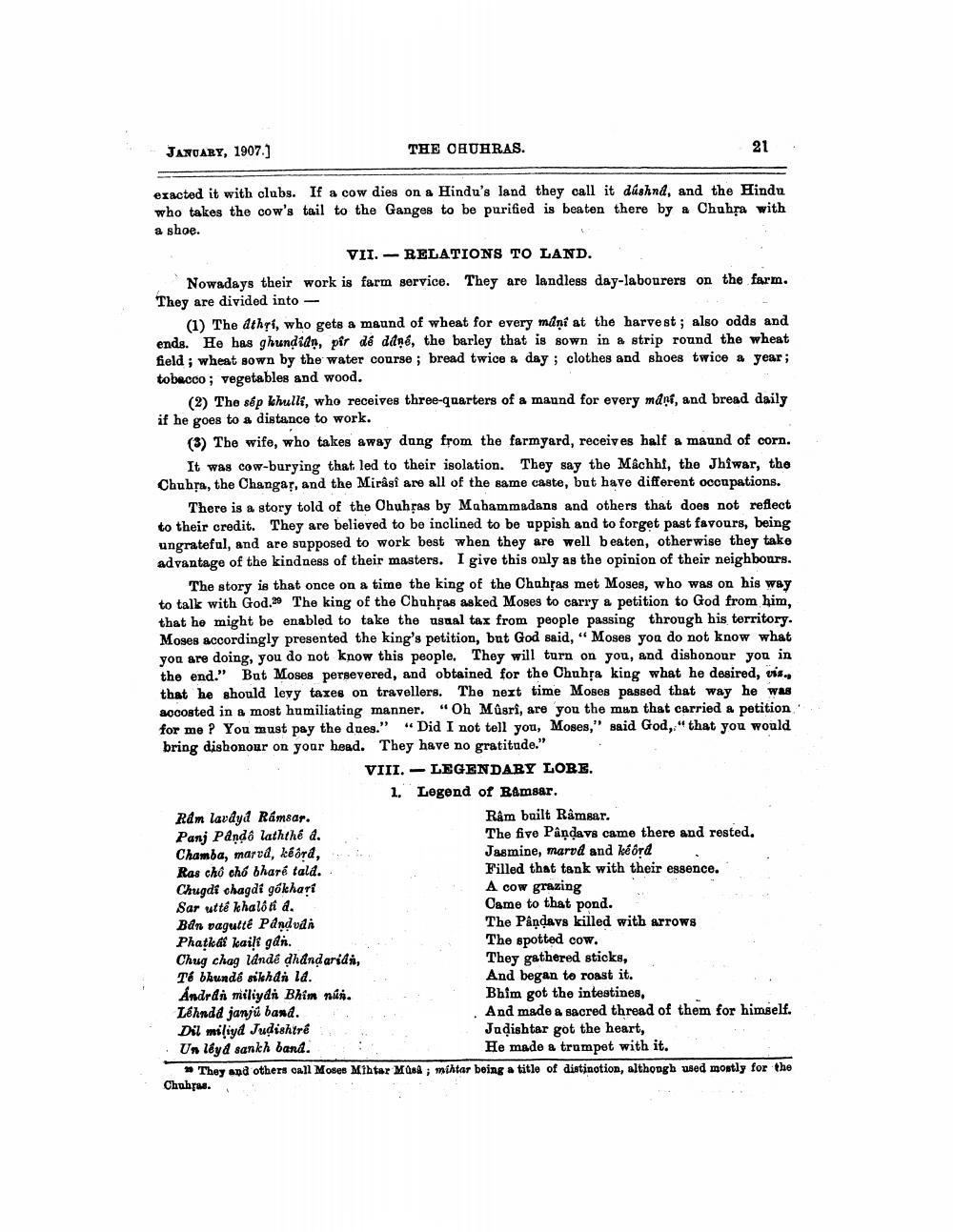________________
JANUARY, 1907.)
THE CHURRAS.
21
.
eracted it with clubs. If a cow dies on a Hindu's land they call it dashnd, and the Hindu who takes the cow's tail to the Ganges to be purified is beaten there by a Chuhra with a shoe.
VII. - RELATIONS TO LAND. Nowadays their work is farm service. They are landless day-labourers on the farm. They are divided into -
(1) The athri, who gets a maund of wheat for every mini at the harvest; also odds and ends. He has ghundian, pir dé dane, the barley that is sown in a strip round the wheat field; wheat sown by the water course ; bread twice a day; clothes and shoes twice a year; tobacco; vegetables and wood.
(2) The sếp khulli, who receives three-quarters of a maund for every manf, and bread daily if he goes to a distance to work.
(3) The wife, who takes away dung from the farmyard, receives half a maund of corn.
It was cow-burying that led to their isolation. They say the Machhf, the Jhiwar, the Chuhra, the Changar, and the Mirâsi are all of the same caste, but have different occupations.
There is a story told of the Ohuhņas by Mahammadans and others that does not reflect to their credit. They are believed to be inclined to be uppish and to forget past favours, being ungrateful, and are supposed to work best when they are well beaten, otherwise they take advantage of the kindness of their masters. I give this only as the opinion of their neighbours.
The story is that once on a time the king of the Chahras met Moses, who was on his way to talk with God.29 The king of the Chuhras asked Moses to carry a petition to God from him, that he might be enabled to take the usual tax from people passing through his territory. Moses accordingly presented the king's petition, but God said, "Moses you do not know what you are doing, you do not know this people. They will turn on you, and dishonour you in the end." But Moses persevered, and obtained for the Chuhra king what he desired, vis. that he should levy taxes on travellers. The next time Moses passed that way he was accosted in a most humiliating manner. “Oh Mûsri, are you the mun that carried a petition for me? You must pay the dues." "Did I not tell you, Moses," said God, that you would bring dishonour on your head. They have no gratitude."
VIII. - LEGENDARY LORE.
1. Legend of Ramsar. Rám lavdyd Rámsar.
Ram built Ramsar. Panj Panda laththe a.
The five Pandavs came there and rested, Chamba, marvd, kéord,
Jasmine, marpd and kéord Ras chô chá bharé tald.
Filled that tank with their essence. Chugdi chagdi gókhari
A cow grazing Sar uttê khaló li d.
Came to that pond. Bàn tagutt6 Pandoải
The Påndavs killed with arrows Phatkdi kaist gdn.
The spotted cow. Chug chag lande dhandarida,
They gathered sticks, Té bkunde sikhdi la.
And began to roast it. Andrdi miliydn Bhim nú.
Bhim got the intestines, Léhnda janjú band.
And made a sacred thread of them for himself. Dil miliyd Judishtrê
Jadishtar got the heart, · Un léyd sankh band.
He made a trumpet with it. A They and others call Moser Mihtar MORA; mihtar being a title of distinotion, althongh used mostly for the Chuha.




